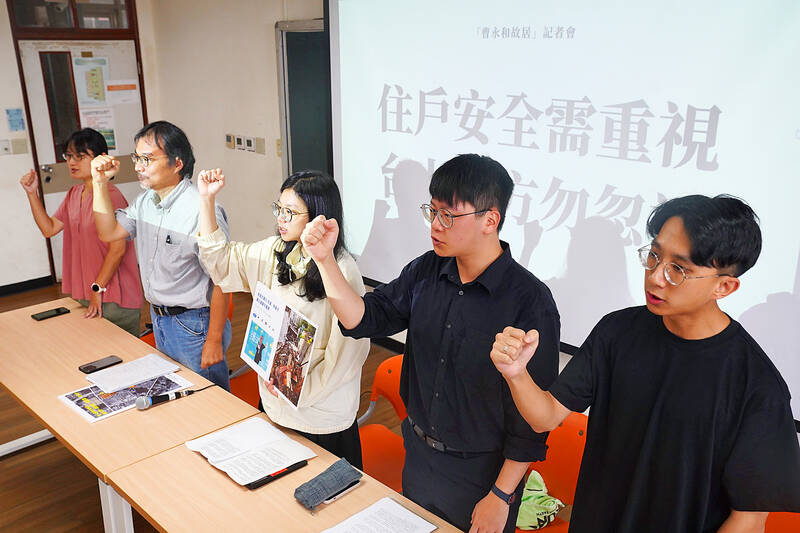Cultural workers and students yesterday condemned National Taiwan University (NTU) for demolishing the former residence of late historian Tsao Yung-ho (曹永和) on Wednesday without prior notice to residents.
The university rushed the razing of the first batch of dormitories built in 1928, cultural assets preservation worker Chen Chin-chung (陳勤忠) told a news conference in Taipei, adding that the demolition occurred ahead of National Cultural Heritage Day at the weekend and after Minister of Culture Li Yuan (李遠) recently said that “preserving ancient monuments is more important than building mansions.”
NTU Graduate Student Association academic affairs director Chuang Yung-chu (莊詠竹) said the demolition involved the Nos. 2, 4 and 6 properties on Lane 52 of Wenzhou Street.

Photo: CNA
House No. 6 was Tsao’s former residence, Chuang said.
A widow of a deceased former professor of the university, surnamed Ho (何), resides in house No. 8, a townhouse adjoining Tsao’s former residence and the only surviving residence among the dormitories, she said.
The teardown of Tsao’s former residence might have caused structural damages to her house, she added.
Chuang quoted local residents as saying that they had not received any notice about the demolition until personnel from the university’s General Affairs Office and demolition workers arrived at Ho’s house at about 7am on Wednesday.
The workers told the residents they would raze the neighboring buildings shortly before cutting power to Ho’s house the same day, she quoted the residents as saying.
The university said that residents had been informed of the demolition.
The four houses were culturally significant because their construction marked the beginning of Wenzhou Street, which features numerous old houses and trees, Chen said.
He questioned the city government’s review process of the demolotion project.
None of the 20 members of the Taipei Cultural Assets Review Committee entered Ho’s residence to evaluate the houses’ cultural assets, and in their review meetings, no one addressed that Tsao had lived at house No. 6 for 42 years, he said.
Although the academic and his residence is spiritually interconnected, the committee decided in May that Tsao’s former home “had no value as a cultural asset,” as it had been renovated many times, former NTU Graduate Student Association vice president Kao Cheng-yung (高鉦詠) said.
An administrative appeal of the demolition of Tsao’s former residence has been filed, Chuang said, adding that NTU must propose solutions to preserve cultural assets.
NTU said in a statement yesterday that the demolition notice had been pasted on the doors of the houses before Wednesday.
During an on-site inspection, university personnel had also informed the resident living in house No. 8 about the razing of the three houses and the plan to reinforce the walls between houses Nos. 6 and 8 in mid-July ahead of the demolition, it said.
The resident thanked the university for carefully carrying out the demolition work without affecting her residential rights, the university said, adding that the resident had been fully informed of the project.
Communications about the demolition were made in compliance with Article 15 of the Cultural Heritage Preservation Act (文化資產保存法) with residents and cultural assets preservation groups, who had voiced their opinions on the issue multiple times until the committee decided the houses “had no value as cultural assets,” it said.

US climber Alex Honnold is to attempt to scale Taipei 101 without a rope and harness in a live Netflix special on Jan. 24, the streaming platform announced on Wednesday. Accounting for the time difference, the two-hour broadcast of Honnold’s climb, called Skyscraper Live, is to air on Jan. 23 in the US, Netflix said in a statement. Honnold, 40, was the first person ever to free solo climb the 900m El Capitan rock formation in Yosemite National Park — a feat that was recorded and later made into the 2018 documentary film Free Solo. Netflix previewed Skyscraper Live in October, after videos

Starting on Jan. 1, YouBike riders must have insurance to use the service, and a six-month trial of NT$5 coupons under certain conditions would be implemented to balance bike shortages, a joint statement from transportation departments across Taipei, New Taipei City and Taoyuan announced yesterday. The rental bike system operator said that coupons would be offered to riders to rent bikes from full stations, for riders who take out an electric-assisted bike from a full station, and for riders who return a bike to an empty station. All riders with YouBike accounts are automatically eligible for the program, and each membership account

A classified Pentagon-produced, multiyear assessment — the Overmatch brief — highlighted unreported Chinese capabilities to destroy US military assets and identified US supply chain choke points, painting a disturbing picture of waning US military might, a New York Times editorial published on Monday said. US Secretary of Defense Pete Hegseth’s comments in November last year that “we lose every time” in Pentagon-conducted war games pitting the US against China further highlighted the uncertainty about the US’ capability to intervene in the event of a Chinese invasion of Taiwan. “It shows the Pentagon’s overreliance on expensive, vulnerable weapons as adversaries field cheap, technologically

NUMBERs IMBALANCE: More than 4 million Taiwanese have visited China this year, while only about half a million Chinese have visited here Beijing has yet to respond to Taiwan’s requests for negotiation over matters related to the recovery of cross-strait tourism, the Tourism Administration said yesterday. Taiwan’s tourism authority issued the statement after Chinese-language daily the China Times reported yesterday that the government’s policy of banning group tours to China does not stop Taiwanese from visiting the country. As of October, more than 4.2 million had traveled to China this year, exceeding last year. Beijing estimated the number of Taiwanese tourists in China could reach 4.5 million this year. By contrast, only 500,000 Chinese tourists are expected in Taiwan, the report said. The report